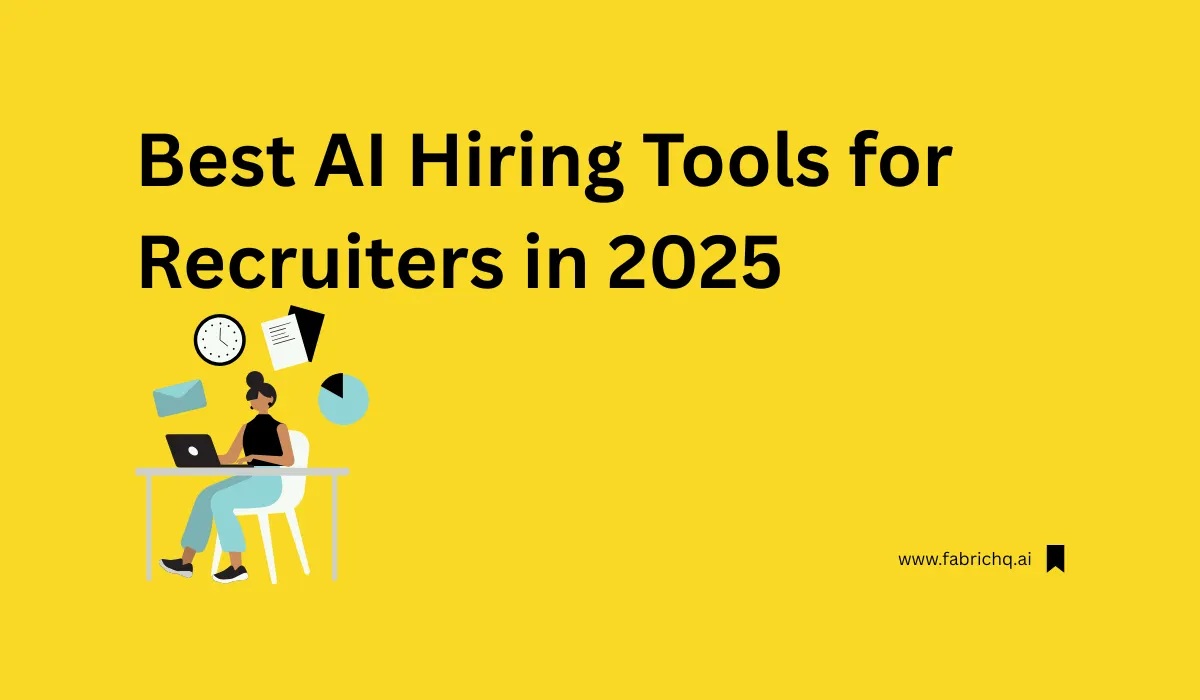It’s Tuesday morning, and your ATS is overflowing again. Hundreds of resumes per role, half keyword-stuffed, half irrelevant.
And your hiring manager wants interviews scheduled yesterday.
Even if you manage to build a shortlist, you’re staring at another week of screening calls that drain hours without getting you closer to the right hire.
These are the two biggest time sinks in recruiting: resume screening and first-round interviews.
You need a plan. A solid one that is fast, fair, gives you a shortlist of high-potential candidates, and doesn’t suck the life out of you.
I am going to walk you through the best AI hiring tools for recruiters in 2025 that can get you from posting jobs to closing positions without popping aspirin like tic tacs.
Top AI Hiring Tools for Recruiters in 2025 by Use Case
Resume Screening
- Wellfound: AI Resume screening and AI sourcing.
- Manatal: Candidate sourcing and enrichment + AI-powered recommendations.
- Fetcher: Resume screening and scoring
- Hirebeat: AI resume analysis
- Loxo: Resume screening + predictive analytics
AI Interviews
- Fabric: Two-way adaptive interviews with follow-ups, fraud detection, and detailed candidate reports.
- Interviewer.ai: One-way video interviews + form-based screening.
- Workable: One-way video interviews + science-backed assessments.
- Canditech: One-way video interviews + skill assessments
- Hireflix: One-way video interviews
How Did I Evaluate These AI Hiring Tools?
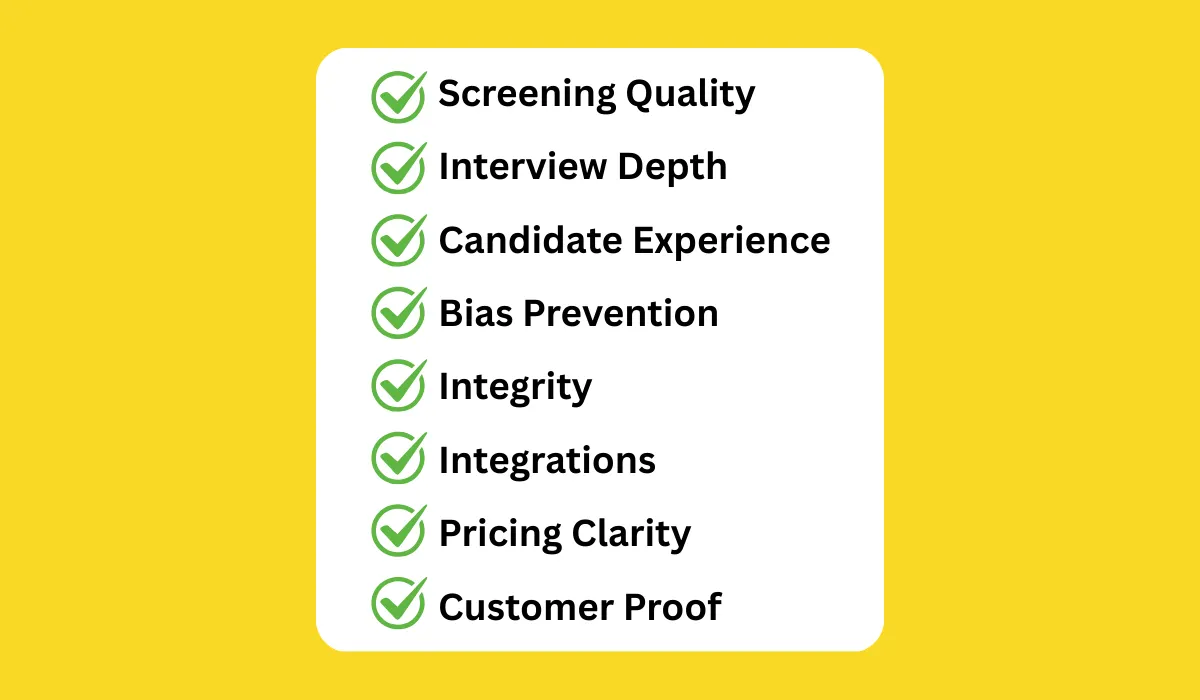
Look, anyone can throw together a list of “best AI tools for recruiters” based on marketing material. I actually tested and compared them based on criteria that matter to recruiters:
- Screening Quality: Do they detect real skills or just match keywords? I tested with deliberately keyword-stuffed resumes to see what would slip through.
- Interview Depth: Can the AI engage in a genuine conversation, with follow-ups, rather than just scripted questions?
- Candidate Experience: If your candidates hate the process, you’re not getting their best effort. I looked for mobile-friendly interfaces and clear next steps.
- Bias Prevention: Skills-based assessments beat demographic guessing every time.
- Integrity: Can they catch AI-assisted or inconsistent answers, without intrusive proctoring?
- Integrations: Does it work with your current setup, or do you need to rebuild everything?
- Pricing Clarity: No “contact us for pricing” nonsense. You’ll see real numbers in both USD and INR.
- Customer Proof: Rather than just testimonials, I looked for numbers showing actual time savings and improved hire quality.
The Best AI Hiring Tools for Resume Screening
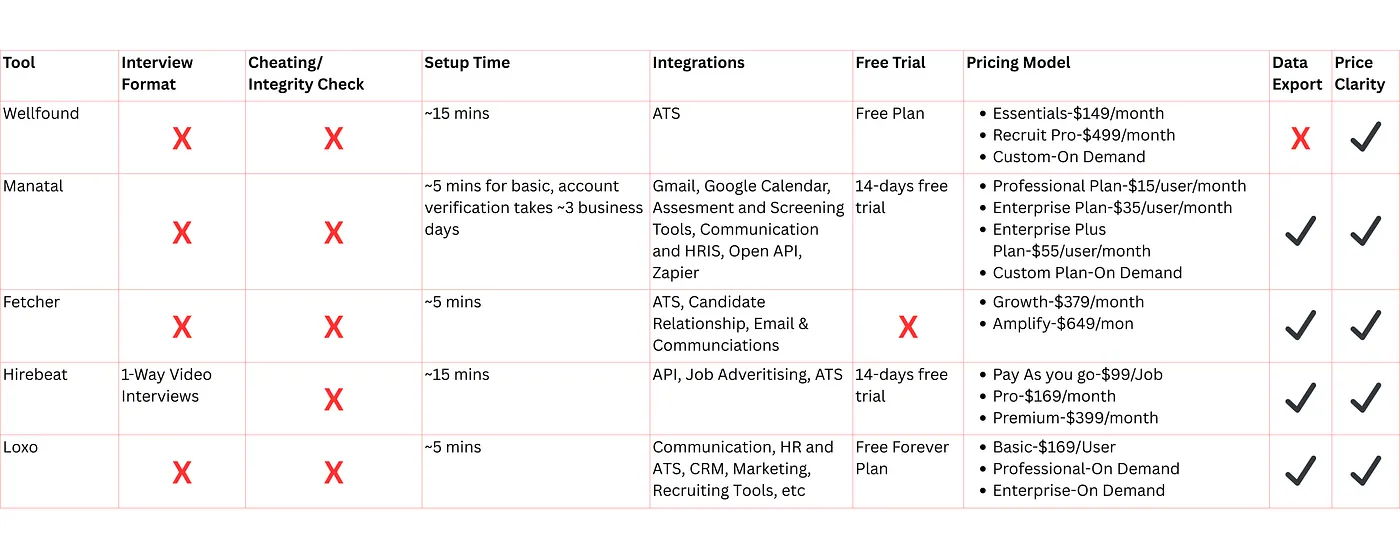
On average, hundreds of applicants apply for a single position. Going through each one manually would make hiring time hit the stratosphere, so we use ATS.
But ATS only matches keywords, so it is easily gamed. You end up with “qualified” resumes on paper that crumble in interviews, while genuinely strong candidates slip through.
AI-powered resume screening goes a step further. Instead of scanning for keywords, these tools evaluate experience, skills, and relevance, surfacing candidates that truly fit the JD:
- Wellfound: Wellfound lets you post unlimited jobs for free and comes with a lightweight ATS. Its AI resume screening and sourcing tools scan inbound resumes and highlight good fits.
- Manatal: Manatal screens resumes as well as enriches candidate profiles, pulling in social data, career history, and skills. Its AI recommendations then match candidates against open roles based not just on keywords, but actual relevance. It also lets you create branded career pages.
- Fetcher: Fetcher uses Machine Learning to screen and score resumes based on skills, keywords, as well as experience in context.
- Hirebeat: With Hirebeat, you can push out jobs to 100+ job boards and use its programmatic ads to bring in a high volume of resumes. But that’s where our problem started, right? Then, its AI resume analysis quickly identifies the best candidates. It also has one-way video screening built in so you also get an early sense of personality and communication skills before booking live interviews.
- Loxo: Loxo is a sourcing-first platform, but it brings predictive analytics and AI-powered screening into the mix. Recruiters can build targeted candidate lists, then run them through Loxo’s AI, which analyzes resumes and suggests who’s most likely to be a strong fit. Features like Outreach GPT even automate the engagement part, so you’re actively moving the right ones into the funnel.
The Best AI Interview Tools in 2025
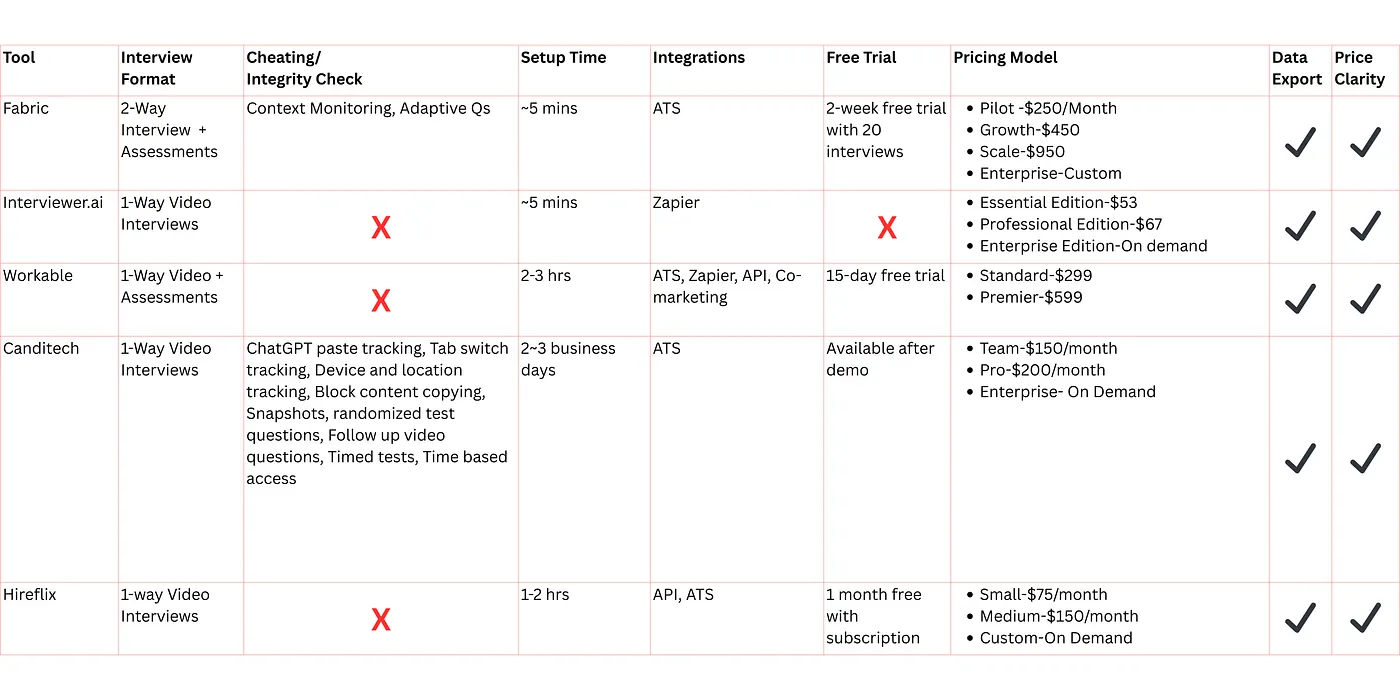
Early-stage interviews are a huge time sink. Recruiters can spend hours coordinating schedules, running repetitive first-round interviews, and evaluating candidates, all before the hiring manager even sees a single strong candidate. AI interview tools help solve this by automating pre-screens, scoring responses, and giving structured reports that let you focus on top talent.
- Fabric: Fabric combines intelligent resume screening with two-way AI interviews, making it one of the best tools for recruiters in 2025. Candidates interview whenever is convenient for them, doing away with scheduling headaches. Fabric understands the day-to-day requirements and checks if the candidate’s experience aligns with them. It also detects keyword stuffing. Fabric’s standout feature is its interactive AI interviews. The AI interviewer can adapt to responses, ask follow-up questions if answers are vague or inconsistent, and detect if answers are AI-generated. Fabric generates detailed reports that you can then share with hiring managers.
- Interviewer.AI: With interviewer.AI, you can set up one-way video interviews or form-based pre-screening. It captures responses so you don’t have to spend time on scheduling and conducting repetitive L1 interviews. The features are basic but work well for teams that want the convenience of asynchronous interviews but want to keep the decision-making in their own hands.
- Workable: Workable combines one-way video interviews with science-backed assessments. Its AI-powered candidate recommendations give a little boost to the decision-making process. It’s not very interactive, but it can compress the first round screening process considerably.
- Canditech: Canditech combines one-way video interviews with skill assessments. Candidates complete assessments and videos asynchronously. This is especially useful for technical roles or positions requiring measurable skills, as it lets recruiters filter out mismatched candidates before live interviews, ensuring only qualified applicants move forward. It also has various anti-cheating features like tab switch tracking, ChatGPT paste tracking, etc.
- Hireflix: Hireflix offers one-way video interviews that candidates complete on their own schedule. While it’s lighter on assessment features, its ease of use makes it well-suited for teams needing a fast pre-screen solution.
Before you commit:
1. Check usage limits (number of job posts, candidate profiles, interviews/month).
2. Look at the trial experience.
3. Confirm setup support is included.
4. Ensure easy data export so you’re not locked in.
Run a 1-week pilot on a single role to measure time saved and shortlist clarity before committing. Even small teams can test high-value tools without overspending.
How Do AI Hiring Tools Prevent Cheating (Without Losing Candidates)
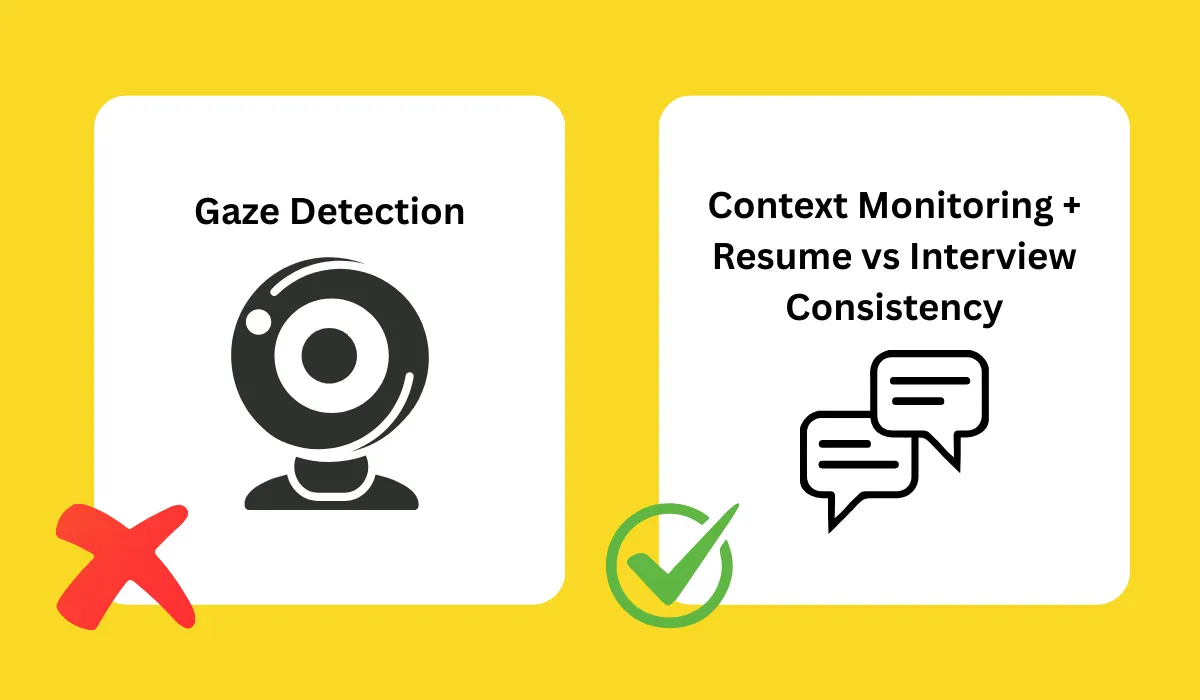
Now that we have spoken about the best AI hiring tools in 2025, it brings us to the question of how these tools prevent cheating without alienating candidates.
The same nightmare haunts every recruiter today, a candidate aces the interview, only for the team to later realize ChatGPT or other AI Tools whispered all the answers.
But, anti-cheating measures can’t be too heavy or you risk alienating candidates.
The best tools instead use multi-signal integrity checks to maintain fairness while keeping the experience smooth:
- Consistency between the resume and interview
AI cross-references a candidate’s claimed experience, skills, and past roles with their responses in interviews. This helps flag discrepancies without questioning the candidate directly. - AI answer detection
Instead of intrusive proctoring methods like gaze detection, tools like Fabric ask follow-up questions and analyze response patterns to detect AI answers. This forces applicants to explain their reasoning, show problem-solving ability, and demonstrate that they actually understand the role. All this while detecting AI answers without making candidates uncomfortable.
FAQs
- Which tool gets you to a shortlist the fastest?
Fabric is designed for high-volume hiring, delivering shortlists quickly through adaptive AI interviews. - How do I compare interview quality across tools fairly?
Look at interview scorecards, the depth of AI follow-up questions, and candidate feedback to see which tool produces the most reliable insights. - Do I still need resume screening if interviews are automated?
Yes. Automated screening filters out misaligned candidates early, so you only invest interview time in serious fits. - How do tools handle cheating/AI assistance without webcams?
The best AI hiring tools use multi-signal checks, such as reasoning-based follow-ups and resume-to-interview consistency without intrusive proctoring. - Will these tools integrate with my ATS and current workflow?
Most leading platforms offer smooth integrations, but it’s worth checking setup specifics for your ATS or tools. - Are AI Hiring tools worth it for a small team?
Absolutely. Start with a pilot on a single role, then measure time saved and shortlist clarity before scaling. - How can I evaluate fairness and bias reduction in practice?
Look for tools that emphasize skills-based assessments, provide bias-audit support, and show transparency in scoring.
Try running a two-week pilot with Fabric. All you have to do is:
- Write your job description
- Drop the link into Fabric
- Watch CVs come in and get automatically screened
- Let AI handle first-round interviews
- Get a ready-to-review top shortlist for your hiring manager
Trusted by teams at Inshorts, QuickReply, and Zettamine, Fabric helps recruiters cut time to hire by up to 60% while keeping the candidate experience smooth and fair.
Stop drowning in resumes. Start a one-week pilot with Fabric today and get your first recruiter-ready shortlist in just 48 hours.
